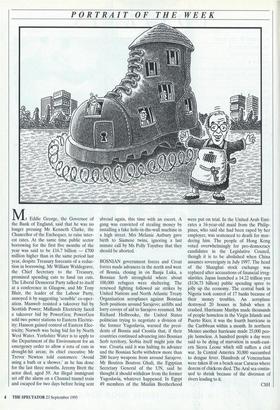PORTRAIT OF THE WEEK
Mr Eddie George, the Governor of the Bank of England, said that he was no longer pressing Mr Kenneth Clarke, the Chancellor of the Exchequer, to raise inter- est rates. At the same time public sector borrowing for the first five months of the year was said to be £16.7 billion — £700 million higher than in the same period last year, despite Treasury forecasts of a reduc- tion in borrowing. Mr William Waldegrave, the Chief Secretary to the Treasury, promised spending cuts to fund tax cuts. The Liberal Democrat Party talked to itself at a conference in Glasgow, and Mr Tony Blair, the leader of the Labour Party, annoyed it by suggesting 'sensible' co-oper- ation. Manweb resisted a takeover bid by Scottish Power; Midlands Electricity faced a takeover bid by PowerGen; PowerGen sold two power stations to Eastern Electric- ity; Hanson gained control of Eastern Elec- tricity; Norweb was being bid for by North West Water. Yorkshire Water is to apply to the Department of the Environment for an emergency order to allow a' rota of cuts in drought-hit areas; its chief executive Mr Trevor Newton told customers: 'Avoid using a bath or a shower,' as he has done for the last three months. Jeremy Brett the actor died, aged 59. An illegal immigrant set off the alarm on a Channel tunnel train and escaped for two days before being sent abroad again, this time with an escort. A gang was convicted of stealing money by installing a fake hole-in-the-wall machine in a high street. Mrs Melanie Astbury gave birth to Siamese twins, ignoring a last minute call by Ms Polly Toynbee that they should be aborted.
BOSNIAN government forces and Croat forces made advances in the north and west of Bosnia, closing in on Banja Luka, a Bosnian Serb stronghold where about 100,000 refugees were sheltering. The renewed fighting followed air strikes by United Nations and North Atlantic Treaty Organisation aeroplanes against Bosnian Serb positions around Sarajevo; airlifts and lorry covoys of aid to Sarajevo resumed. Mr Richard Holbrooke, the United States politician trying to negotiate a division of the former Yugoslavia, warned the presi- dents of Bosnia and Croatia that, if their countries continued advancing into Bosnian Serb territory, Serbia itself might join the war. Croatia said it was halting its advance and the Bosnian Serbs withdrew more than 200 heavy weapons from around Sarajevo. Mr Boutros Boutros Ghali, the Egyptian Secretary General of the UN, said he thought it should withdraw from the former Yugoslavia, whatever happened. In Egypt 49 members of the Muslim Brotherhood were put on trial. In the United Arab Emi- rates a 16-year-old maid from the Philip- pines, who said she had been raped by her employer, was sentenced to death for mur- dering him. The people of Hong Kong voted overwhelmingly for pro-democracy candidates in the Legislative Council, though it is to be abolished when China assumes sovereignty in July 1997. The head of the Shanghai stock exchange was replaced after accusations of financial irreg- ularities. Japan launched a 14.22 trillion yen ($136.73 billion) public spending spree to jolly up the economy. The central bank in Nigeria took control of 17 banks because of their money troubles. An aeroplane destroyed 20 houses in Sabah when it crashed. Hurricane Marilyn made thousands of people homeless in the Virgin Islands and Puerto Rico; it was the fourth hurricane in the Caribbean within a month. In northern Mexico another hurricane made 25,000 peo- ple homeless. A hundred people a day were said to be dying of starvation in south-east- ern Sierra Leone which still suffers a civil war. In Central America 30,000 succumbed to dengue fever. Hundreds of Venezuelans were taken ill on a beach near Caracas where dozens of chickens died. The Aral sea contin- ued to shrink because of the diversion of rivers leading to it.
CSH


































































 Previous page
Previous page